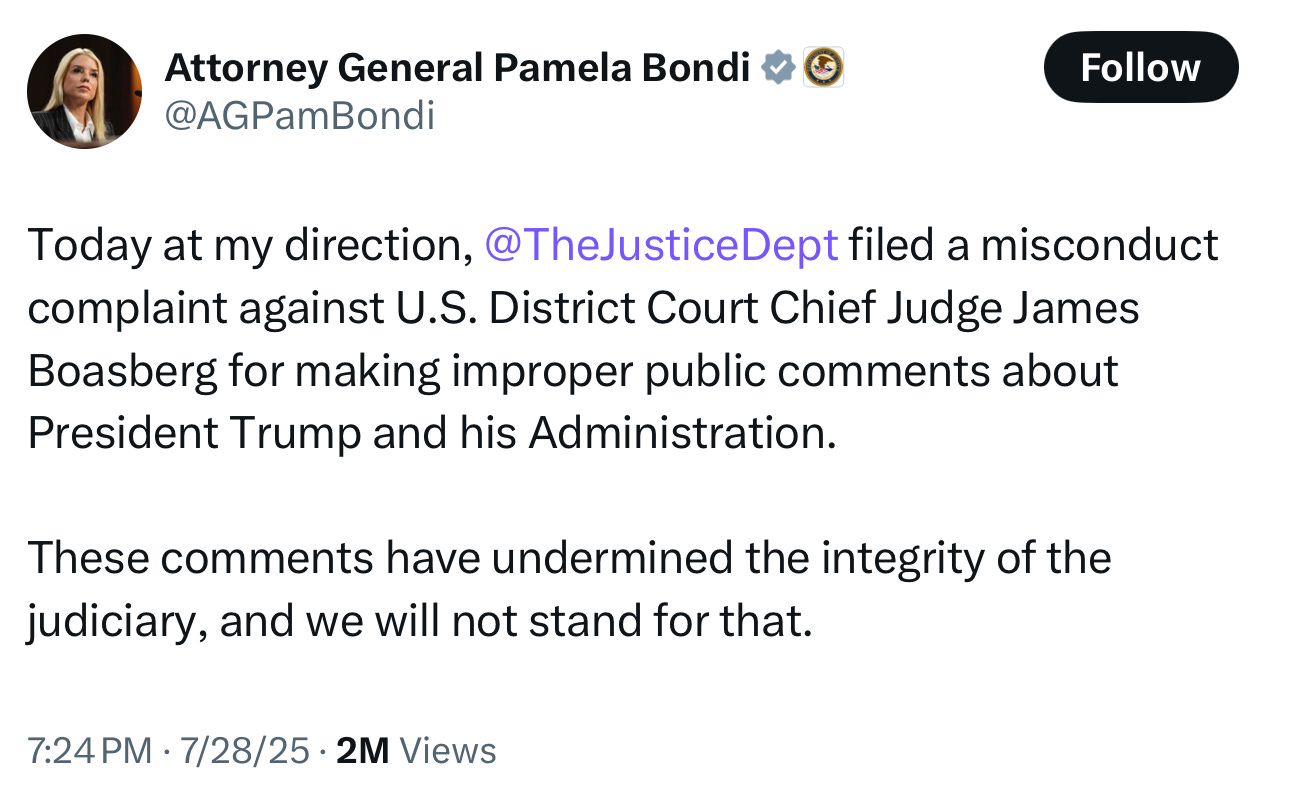Legal roundup: DOJ lies about Boasberg, and whistleblowers can't stop Bove
Attorney General Pam Bondi's office misrepresents what Boasberg allegedly said, and how he said it, to gin up an ethical controversy.
It is becoming increasingly urgent to be able to call lies by their name.
All Rise News will never flinch from the task when it’s warranted.
Like a naked emperor spared a taboo observation about his fine attire, the Trump Justice Department has largely escaped an objective assessment about its misconduct complaint against Chief U.S. District Judge James Boasberg.
It is based on lies.
That is to say, the complaint is not merely false or deeply misleading. It is premised on a doctored quotation of what Boasberg allegedly said in a closed-door meeting and a misrepresentation of the circumstances in which the federal judge reportedly said it.
Listen to my explanation on Sirius XM Progress yesterday with host Joe Sudbay
The sleight-of-hand
At the direction of Attorney General Pam Bondi, her chief of staff Chad Mizelle wrote: “Judge Boasberg attempted to improperly influence Chief Justice Roberts and roughly two dozen other federal judges by straying from the traditional topics to express his belief that the Trump Administration would ‘disregard rulings of federal courts’ and trigger ‘a constitutional crisis.’”
Mizelle had been quoting a memorandum leaked to the pro-Trump website The Federalist, whose original article exposes the government’s sleight-of-hand.
According to the article, the leaked memo from the March 11th meeting of the Judicial Conference of the United States said: “District of the District of Columbia Chief Judge James Boasberg next raised his colleagues’ concerns that the Administration would disregard rulings of federal courts leading to a constitutional crisis.”
As the only record of the closed-door meeting, the memo summarizes what Boasberg allegedly said in private, and its publicly reported contents are silent on Boasberg’s own views on whether the Trump administration would defy court orders. The memo only states that Boasberg voiced his “colleagues’ concerns” at a time of a national conversation about whether Trump had been courting a constitutional crisis. (The Trump administration now stands accused of flouting roughly a third of the major rulings against it.)
More careful than the federal government, The Federalist breathlessly titled the article: “EXCLUSIVE: Memo Reveals D.C. Judges Are Predisposed Against Trump Administration.” Even if the headline’s editorial slant is tendentious, at best, The Federalist at least correctly attributed the reported sentiments to the D.C. District bench’s well-founded concerns that the Trump administration would defy court orders.
The Justice Department displayed no such caution: “On March 11, 2025, at one of the Conference’s semiannual meetings, Judge Boasberg disregarded its history, tradition, and purpose to push a wholly unsolicited discussion about ‘concerns that the administration would disregard rulings of federal courts, leading to a constitutional crisis,’” Mizelle wrote.
Zealously mindful of our credibility and reputations, reporters tend to hesitate before calling a false claim a lie, which presumes knowledge of the intent of the speaker to deceive. Journalists are not clairvoyant, but evidence of intent rarely becomes clearer than Mizelle’s selective quotation.
Read the full quotation with Mizelle’s edit highlighted in bold:
“District of the District of Columbia Chief Judge James Boasberg next raised his colleagues’ concerns that the Administration would disregard rulings of federal courts leading to a constitutional crisis.”
With surgical precision, Mizelle’s misconduct complaint omits any mention of Boasberg’s “colleagues,” a word that does not appear anywhere in the document.
“Improper public comments”
As prominent legal analyst Steve Vladeck recently noted on “One First,” the sentiments that the attorney general’s office misattributed to Boasberg would not be censurable even if he had expressed them.
The Justice Department claims that Boasberg violated canons of the federal judicial Code of Conduct to “uphold the integrity and independence of the judiciary,” “act at all times in a manner that promotes public confidence in the integrity and impartiality of the judiciary,” and avoid “public comment on the merits of a matter pending or impending in any court.”
But Boasberg didn’t make any of the remarks quoted in the complaint in a public forum.
Bondi’s claim to the contrary in a social media post is another lie.
Had Boasberg expressed fears that the Trump administration would defy court orders, that concern would have been well-founded. Consider the central statistic of this Washington Post headline: “Trump officials accused of defying 1 in 3 judges who ruled against him.”
Former Justice Department lawyer Erez Reuveni’s whistleblower complaint against Trump’s ex-criminal defense attorney turned senior Justice Department official turned newly confirmed Third Circuit Judge Emil Bove shows the most extreme example.
Reuveni said, and Bove never denied, that Bove instructed prosecutors — in a private meeting whose substance later became public — to prepare to tell courts “f—k you” in order to implement Trump’s immigration agenda. Text and email messages backed up Reuveni’s account.
Other whistle-blowers subsequently stepped forward, but it was far from certain any number of their ranks would ever have been enough to slow Bove’s juggernaut in the GOP-dominated Congress.
In a statement last night, Sen. Sheldon Whitehouse (D-R.I.) predicted that his colleagues on the other side of the aisle “will come to regret this vote.”
“The lawless character of Emil Bove will continue to reveal itself during his tenure on the bench, no doubt, and ethics questions from his DOJ tenure will persist, no matter how much Republicans would like to make this all go away by voting yes tonight,” Whitehouse wrote on Tuesday night.
The Justice Department did not immediately respond to a request for comment.





The only intelligence this administration demonstrates is that of fabricating untruths to win an argument, to justify legislation or other actions, or to evade responsibility.
Should democracy be restored, Bove (Hollywood needs him for its next horror killer-fest), will be among the first to be turfed out (one hopes without violence).